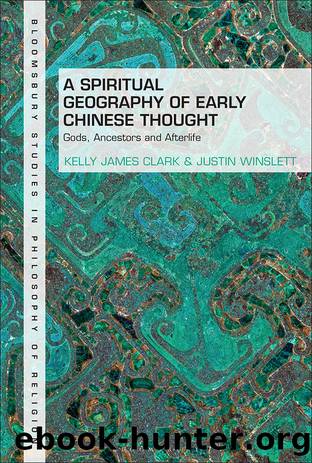A Spiritual Geography of Early Chinese Thought by Kelly James Clark

Author:Kelly James Clark
Language: eng
Format: epub
Publisher: Bloomsbury Publishing
Part Four
A Deeper Dive
8
The Evolutionary Psychology of Chinese Religion
Cognitive Science and Religion
Empirical support for Chinese deities can be found in the newly emerging cognitive science of religion.1 Cognitive science rejects the assumption that cultural groups are radically different. Studies show that our common biological heritage and relatively similar environments produce both relatively similar minds and relatively similar beliefs. Evolutionary processes have shaped human cognitive faculties and, when those faculties are applied to their specific challenges (which are fairly similar across cultures), produce roughly similar beliefs. These common cognitive faculties include relatively specialized âsubsystemsâ that structure, inform, enhance, and limit our view of the world. Rejecting the empiricist assumption of the mind as a blank slate on which experience writes, cognitive scientists hold that our minds come equipped with a set of cognitive faculties that actively processes our perceptions and shapes our conceptions of the world. Some of these faculties, in turn, have a direct influence upon the origin and development of religious beliefs. According to this model, humans have a natural tendency to believe in gods. Belief in gods naturally arises when certain common cognitive faculties are stimulated. A culture without gods is as much to be expected as a culture without beliefs in other persons or the external world.
In this chapter, we take inspiration from supernatural punishment theory, one expression of the cognitive science of religion, to direct an examination of ancient Chinese texts for specific conceptions of divinity and their relation to humanity. While the cognitive science of religion in general would lead us to expect to find various sorts of disembodied agents in China, supernatural punishment theory in particular would lead us to expect to find a high, moralizing god with strategic knowledge who exercises a kind of moral providence.2
In order to better understand Chinaâs High DeitiesâDi å¸, Shangdi ä¸å¸ and Tian 天âwe have constructed a database of instances of these three terms in texts from the Pre-Qin (Pre-221 BCE) period.3 This database is composed of intuitively coded, representative passages from these texts where these extrahuman agents appear. By employing this database in these capacities, this chapter, guided by supernatural punishment theory, will highlight one of the common ways with which these High Deities are represented in Pre-Qin texts as punishers and rewarders. We then show how the representation of these agents as punishers and rewarders is pervasive throughout the texts of the Pre-Qin period. Though these are too diverse to be fully explained in a single paper, by taking a general survey of these representations, common idioms emerge that continue to present themselves in the passages where these agents are punishers and rewarders. Most commonly, this manifests as a moral dimension with these agents being cast as moralizing agents that punish and reward according to moral criteria, something argued for by cognitive theories of religion. This chapter will hence present and analyze some of the most salient and representative passages that show agents under such representations and idioms, showing them to be both pervasive and fundamental to the Pre-Qin understanding of the High Deities.
Download
This site does not store any files on its server. We only index and link to content provided by other sites. Please contact the content providers to delete copyright contents if any and email us, we'll remove relevant links or contents immediately.
| Confucianism | Feng Shui |
| I Ching | Jainism |
| Karma | Shintoism |
| Sikhism | Tao Te Ching |
| Taoism | Tibetan Book of the Dead |
| Zoroastrianism |
The Tao of Physics by Fritjof Capra(2276)
Human Design by Chetan Parkyn(2074)
The Diamond Cutter by Geshe Michael Roach(2062)
Feng Shui by Stephen Skinner(1941)
The Alchemy of Sexual Energy by Mantak Chia(1860)
Tao Te Ching by Lao Tzu(1842)
365 Tao: Daily Meditations by Ming-Dao Deng(1622)
Tao Tantric Arts for Women by Minke de Vos(1600)
Sun Tzu's The Art of War by Giles Lionel Minford John Tzu Sun(1542)
Sidney Sheldon (1982) Master Of The Game by Sidney Sheldon(1520)
Buddhism 101 by Arnie Kozak(1513)
Karma-Yoga and Bhakti-Yoga by Swami Vivekananda(1496)
The Analects of Confucius by Burton Watson(1436)
The Art of War Other Classics of Eastern Philosophy by Sun Tzu Lao-Tzu Confucius Mencius(1428)
Tao te ching by Lao Tzu(1366)
The Way of Chuang Tzu by Thomas Merton(1365)
The New Bohemians Handbook by Justina Blakeney(1355)
The Sayings Of by Confucius(1317)
Bless This House by Donna Henes(1272)
